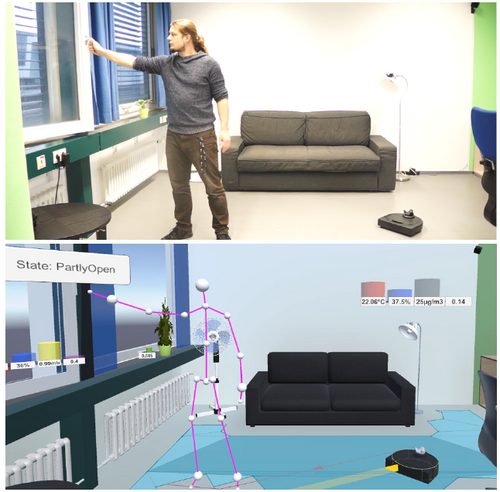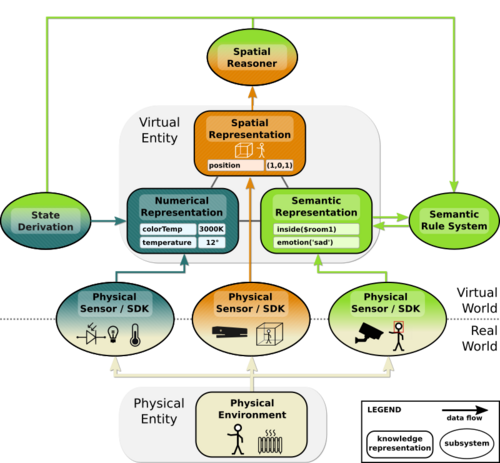Context in Intelligent Environments


According to current trends, the home of the future will be smart and sensor technology will be ubiquitous. The flood of incoming data is used to increase our quality of life, e.g. through smart assistants or home automation. Eventually, this technology will set the scene for socially competent assistive agents to support us in our everyday lives. Such ambient intelligent systems do not only require an extensive amount of data but also a consistent and comprehensive representation of contextual knowledge.
In our research we aim to define these requirements and explore different possibilities to infer and process knowledge in dynamic environments. One of the major principles is that context needs to be adapted to the present situation. We approach this by providing multiple representations of the environment as well as anticipating reasoning methods.
The 'Reflected Reality' system is our in-house prototype and the heart of our smart lab. It is capable of inferring contextual knowledge in a human-agent shared environment, and to provide it to virtual or physical agents when required. It incorporates a semantics-based reasoning engine as well as a state-of-the-art game engine which allow the generation and representation of context on multiple levels of abstraction. The focus is on creating a research environment for agent development and experiments in context-dependent situations.
Videos
Related publications
-
Don’t Touch This! - Investigating the Potential of Visualizing Touched Surfaces on the Consideration of Behavior Change. . In Persuasive Technology 2022, N. Baghaei, J. Vassileva, R. Ali, K. Oyibo (eds.). Springer International Publishing, 2022.
-
Context Matters! Identifying Social Context Factors and Assessing Their Relevance for a Socially Assistive Robot. . In Companion of the 2020 International Conference on Human-Robot Interaction, pp. 409–411. ACM, 2020.
-
What if it speaks like it was from the village? Effects of a Robot speaking in Regional Language Variations on Users’ Evaluations. . In 29th IEEE International Conference on Robot and Human Interactive Communication (RO-MAN 2020), pp. 1315–1320. 2020.
-
(Expressive) Social Robot or Tablet? – On the Benefits of Embodiment and Non-verbal Expressivity of the Interface for a Smart Environment. . In International Conference on Persuasive Technology (PERSUASIVE 2020), Vol. 12064 of Lecture Notes in Computer Science, G.-H. S., J. T., M. C. (eds.). Springer, 2020.
-
Horror Laboratory and Forest Cabin - A Horror Game Series for Desktop Computer, Virtual Reality, and Smart Substitutional Reality. . In Extended Abstracts of the 2020 Annual Symposium on Computer-Human Interaction in Play. ACM, 2020.
-
Smart substitutional reality: Integrating the smart home into virtual reality. . In Entertainment Computing, 31, p. 100306. 2019.
-
Reflected Reality: A Mixed Reality Knowledge Representation for Context-aware Systems. . In 11th International Conference on Virtual Worlds and Games for Serious Applications (VS-Games), pp. 1–4. IEEE, 2019.
-
Identifying Social Context Factors Relevant for a Robotic Elderly Assistant. . In International Conference on Social Robotics (ICSR), Vol. 11876 of Lecture Notes in Computer Science, M. A. Salichs, S. S. Ge, E. I. Barakova, J.-J. Cabibihan, A. R. Wagner, Álvaro C. González, H. He (eds.), pp. 558–567. Springer, 2019.
-
Towards Serious Games and Applications in Smart Substitutional Reality. . In 10th International Conference on Virtual Worlds and Games for Serious Applications (VS-Games 2018), pp. 25–32. IEEE, 2018.
-
PEARS - Physics Extension And Representation through Semantics. . In IEEE Transactions on Computational Intelligence and AI in Games, 8(2), pp. 178–189. 2016.
-
Dynamic Context Integration through Modularized Ontologies and Semantic Blueprints. . In 5th International Workshop on Human-Agent Interaction Design and Models (HAIDM 2016), in conjunction with IJCAI 2016. 2016.
-
Augmented Reasoning in the Mirror World. . In 22nd ACM Conference on Virtual Reality Software and Technology (VRST 2016), pp. 313–314. ACM, Munich, Germany, 2016.


